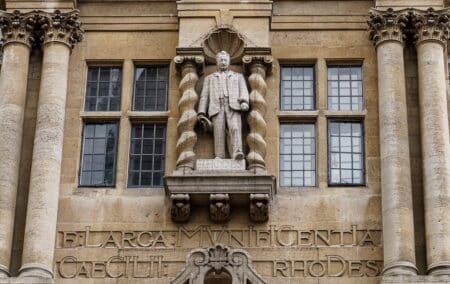A statue of Cecil John Rhodes at Oxford University will not be removed, the university has announced.
Calls for the statue of the British imperialist at Oriel College to be removed gained momentum after a statue of a slave trader Edward Colston was torn down in Bristol last year.
According to the BBC, a majority of members on the commission set up to determine whether the statue should be removed were in favour of this course of action (although most submissions to the commission had supported the statue’s retention).
However, Oriel College said it had no plans to remove the statue because of the costs and planning processes related to taking it away. A statement released by the college said: ‘In light of the considerable obstacles to removal, Oriel’s governing body has decided not to begin the legal process for relocation of the memorials.’
Rhodes, who was born in England in 1853, came to the then Natal Colony in 1870, before going to seek his fortune on the diamond mines of Kimberley in 1871. After establishing agricultural and mining interests, he returned to England to study at Oriel College.
In his will he left about £100 000 to the college, equivalent to about £12.5 million in today’s money. According to the commission, about £200 000 still remains.
After he returned to South Africa, Rhodes’s business interests such as De Beers continued to prosper, and he entered politics, becoming the Cape Colony’s Prime Minister in 1890. He died in 1902, having suffered from health problems for most of his life.
Rhodes was a colossal influence on southern Africa’s politics and economics in the late 19th century, and many of his actions reverberate to this day. However, in recent years many have argued that his legacy is primarily one of racism and white supremacy.
[Image: Howard Stanbury]

